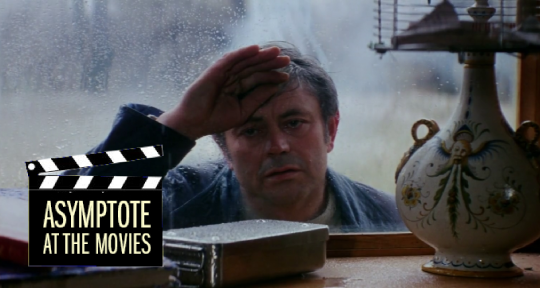Our second feature for Asymptote at the Movies is Andrei Tarkvosky’s Solaris, a 1972 Soviet masterpiece based on Polish writer Stanisław Lem’s 1961 novel of the same name. Arguably one of the greatest science fiction films ever made, the plot focuses on psychologist Kris Kelvin and his arrival at the space station orbiting Solaris, a planet whose ocean had been the focus of intense scientific study for decades. As the two other scientists aboard behave increasingly strangely, Kelvin discovers that they are being “visited” by figures of their past, resurrected in the space station. A complex exploration of man’s place in the universe, his quest for knowledge, and the meaning of love and life, Solaris is a triumph.
Sarah Moore (SM): Sometimes it appears that a novel exists, destined for a certain filmmaker, as if it had in fact been written for such a connection. So it is with Lem’s novel and Tarkvosky; Solaris lends itself perfectly to Tarkovsky’s slow, profound meditations on human nature, the purpose of existence, memory, and the function of art. Lem’s novel is classified as science fiction but (as with many works of science fiction) incorporates a wealth of philosophy and spirituality. Tarkovsky unabashedly confronted the big questions. His films are not designed to entertain—their pleasure comes from the possibility of being forever changed by seeing them. Both the novel and the film are immensely detailed; whenever I watch Tarkovsky’s film, I am always struck by how much there is to comprehend, how much more there is to be contemplated each time. Perhaps a good place to begin this discussion, therefore, is with Tarkovsky’s own impression of Lem:
When I read Lem’s novel, what struck me above all were the moral problems evident in the relationship between Kelvin and his conscience, as manifested in the form of Hari. In fact if I understood, and greatly admired, the second half of the novel—the technology, the atmosphere of the space station, the scientific questions—it was entirely because of that situation, which seems to me to be fundamental to the work. Inner, hidden, human problems, moral problems, always engage me far more than any questions of technology; and in any case technology, and how it develops, invariably relates to moral issues, in the end that is what it rests upon. My prime sources are always the real state of the human soul, and the conflicts that are expressed in spiritual problems.
Tarkovsky’s preference for the human problems over the technological is clear in his huge re-structuring of the plot—or rather, his ability to lengthen the chronology. Whilst the action of Lem’s novel is restricted solely to the space station, such action contributes only three-quarters of Tarkovsky’s film. In a forty-minute prelude, the day before Kelvin’s departure to Solaris, we see him at his parents’ home, surrounded by lush nature. Long sequences of forests, flowing streams, underwater reeds, and large ponds contrast with the sparse, sterile settings of the space station that will appear later. Here, his complicated relationship with his father is introduced and he burns documents over an outside fire, preparing for a total rupture from his life on earth. For a text that so explicitly posits the choice between remaining on Solaris in the pursuit of scientific study and returning to earth, beginning the film in such a naturalistic setting is a huge gesture that places the human at its centre. How do you feel about the tension between “the scientific questions” and the “hidden, human problems” in the film? READ MORE…


